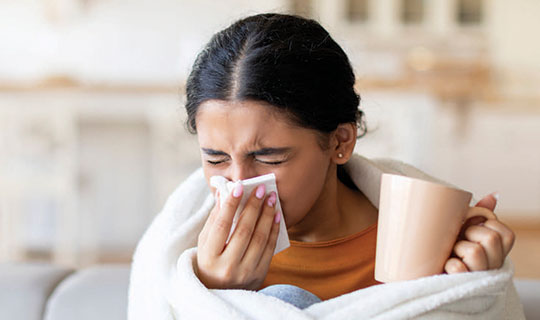
When it comes to respiratory viruses, it is particularly important to stay informed about three common culprits that can cause significant disruptions (and in some cases, severe health complications). They are Respiratory Syncytial Virus (RSV), influenza, and of course, COVID-19.
Understanding the symptoms and knowing when to seek treatment are key to protecting ourselves, our families, colleagues and patients.
Recognizing the Symptoms
Although these three illnesses share similarities, each has unique characteristics. Co-infection can also occur, which can worsen symptoms.
RSV (Respiratory Syncytial Virus):
- More common in small children and older adults.
- Symptoms can include runny nose, coughing, sneezing and fever.
- Severe cases can result in bronchitis or pneumonia.
Influenza (Flu):
- Can present as quick and sudden onset of fever, aches, chills, fatigue, sore throat and congestion.
- Can quickly become more severe, especially in those with pre-existing conditions.
COVID-19:
- Symptoms can range from mild to severe, possibly including fever, cough, sore throat and congestion. Fatigue, shortness of breath, and even loss of smell and taste can also be among the symptoms.
- Because COVID-19 can be mild or even asymptomatic, testing can help curb its spread.
Available Treatments
Safe and effective treatments are available to manage the duration and severity of symptoms for all three viruses. The earlier the diagnosis, the better the results.
- RSV: Hydration, rest, bronchodilators and the use of a humidifier can help manage symptoms. Preventative monoclonal antibodies are available for at-risk infants.
- Influenza: Antiviral treatments, such as oseltamivir (Tamiflu) or baloxavir (Xofluza), can reduce both the severity and duration of symptoms when administered within the first 48 hours.
- COVID-19: Antiviral treatments like Paxlovid and Remdesivir significantly reduce the risk for hospitalization or death in at-risk individuals.
In all instances, oxygen therapy and ventilators may be needed for severe cases.
Although it won’t always prevent infection, vaccination remains the best way to minimize severe flu and COVID-19 symptoms and to reduce the risk of serious illness including the need for hospitalization or death. RSV vaccines are newly available for older adults and those who are pregnant to protect newborns.
When to Seek Help
- RSV: Seek immediate medical attention if symptoms include difficulty breathing, dehydration with less urine output or a bluish tinge around the lips or fingertips.
- Influenza: Consult a physician if symptoms are severe or prolonged. This is especially important for those at higher risk, including pregnant women and the elderly.
- COVID-19: Immediate care is needed for symptoms like difficulty breathing, confusion or persistent chest pain.